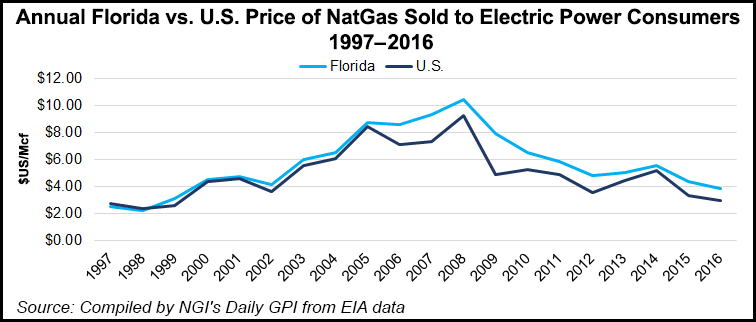Regulatory | Infrastructure | NGI All News Access | NGI The Weekly Gas Market Report
Sabal Trail’s Future Unclear After Appellate Court Rejects Rehearing Requests
The status of a proposed natural gas pipeline in the Southeast appears more uncertain, after a federal appeals court Wednesday denied a request from FERC and the pipeline sponsors to reverse its ruling last year to vacate the project’s permits.

In the U.S. Court of Appeals for the District of Columbia Circuit, a two-judge panel issued an order denying petitions for rehearing from the Federal Energy Regulatory Commission and the sponsors. The full court also denied a petition for rehearing en banc from the pipeline’s joint venture partners — Enbridge Inc.’s Spectra Energy Partners LP as well as NextEra Energy Inc. and Duke Energy.
At issue is a ruling from last August, when a three-judge panel from the court sided with aSierra Club assertion that an environmental impact statement (EIS) FERC conducted over the proposed Southeast Market Pipelines (SMP) project failed to adequately consider the impact of greenhouse gas (GHG) emissions. The court remanded the case to FERC and, in a twist, vacated all of the permits that had been issued for the pipelines.
Last September, in an effort to address the court’s ruling one month earlier, FERC issued a draft version of a supplemental EIS (SEIS) for Sabal Trail. Although the Commission said the document provided court-mandated GHG estimates, as well as details over its methodology, environmental groups and others opposed to the pipelineargued the SEIS was insufficient.
What happens now is unclear, but FERC spokeswoman Tamara Young-Allen told NGI on Thursday that the court could issue its formal mandate next week, which would void Sabal Trail’s certificates.
“We’re still working on two items: the final SEIS, as well as the Commission’s order directed by the court. It’s still pending,” Young-Allen said. Although she declined to comment on whether the Commission would expedite the final version of the SEIS to try to prevent voiding Sabal Trail’s certificates, Young-Allen said “the ruling is under FERC review and they’re determining what their next steps should be.”
In a note to clients Wednesday, ClearView Energy Partners LLC said the circuit court could issue a formal mandate to void Sabal Trail’s certificates by next Wednesday (Feb. 7), but FERC could inform the court that it intends to appeal the decision to the U.S. Supreme Court. In that event, the Commission would ask the circuit court to withhold the mandate until the appeal plays out. But ClearView analysts said FERC rarely makes such appeals, and the Department of Justice would need to agree to bring the case to the Supreme Court on FERC’s behalf.
“If, hypothetically, FERC were to issue a final SEIS as early as [Thursday] current [regulations] appear to require that the Commission wait 30 days before issuing a new certificate to the affected projects,” ClearView’s team said. “We therefore expect that it is possible that the project could need to temporarily wind down construction operations until new certificates can be issued (under our hypothetical that would be in early March), as well as new notices to proceed.”
ClearView analysts said it is unclear how vacating the certificates would impact the parts of Sabal Trail or the Hillabee Expansion that entered service last July. But analysts downplayed industry fears that the court’s GHG ruling could impact other proposed pipeline projects, including the embattled Mountain Valley and Atlantic Coast pipelines.
Environmental advocates opposed to Sabal Trail “will be delighted” with the ruling, but “we think the impact could be more muted, both for the projects involved and more broadly,” ClearView analysts said.
For its part, the Sierra Club showed no signs of backing down. “Sabal Trail has run out of excuses,” said staff attorney Elly Benson. “The court already rejected FERC’s failure to consider the GHG pollution from burning the gas transported by the pipeline. It’s time this dirty, unnecessary pipeline is shut down unless and until FERC conducts a comprehensive review of its climate impacts.”
SMP includes Sabal Trail, the Hillabee Expansion and the Florida Southeast Connection projects. SMP would provide about 1.1 Bcf/d to markets in Florida and the Southeast. The project calls for building 685.5 miles of pipeline and six compressor stations, as well as modifying existing compressor stations in Alabama, Florida and Georgia. FERCissued a favorable final EIS for the projects in December 2015.
© 2024 Natural Gas Intelligence. All rights reserved.
ISSN © 1532-1231 | ISSN © 2577-9877 | ISSN © 1532-1266 |
